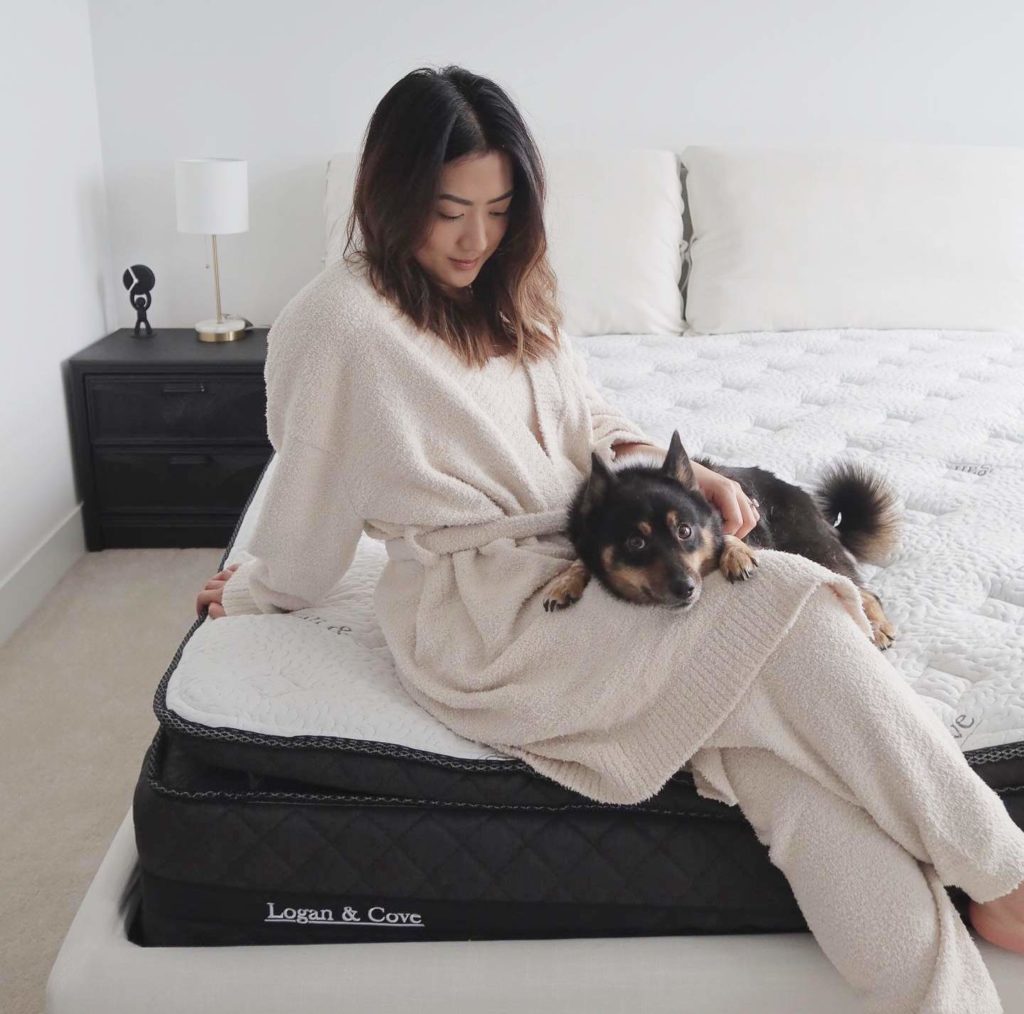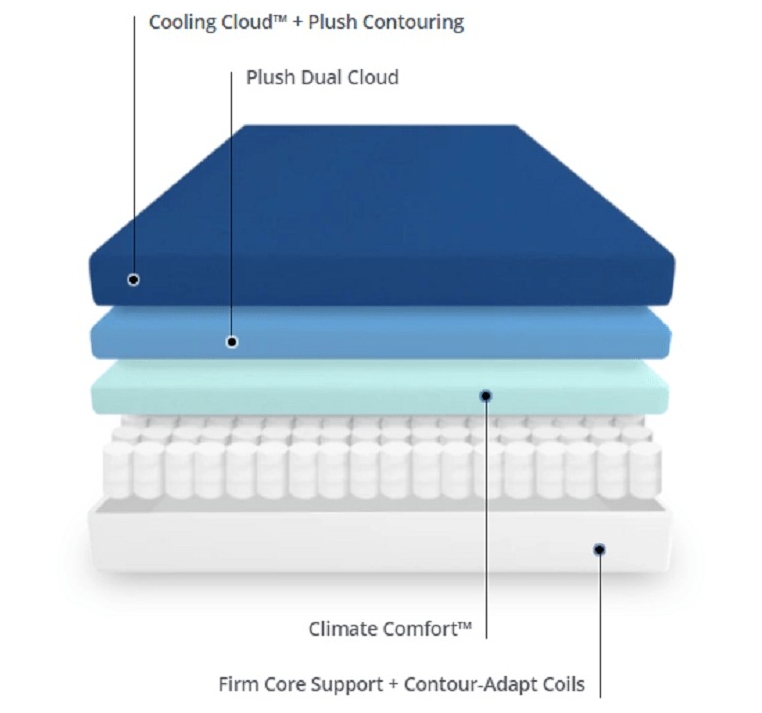Best Mattresses According To Doctors 2024
A doctor recommended mattress typically provides proper support and comfort to promote restful sleep and helps to reduce the symptoms of pain, sleep apnea, heart disease, fibromylagia, and other medical conditions.
Providers get a lot of productive feedback from patients and become familiar with brands and mattress types to develop a working knowledge of the materials used. I was a mattress manufacturer for 25 years and designed a lot of custom mattresses for patients with a host of medical issues.
Here are the categories of doctor recommended mattress options often recommended to patients:
- Memory Foam Mattresses: These mattresses conform to the shape of the body, providing support and pressure relief. They are particularly prescribed or recommended with joint or back pain.
- Latex Mattresses: Latex mattresses offer similar benefits to memory foam but are more responsive and tend to have a bit more bounce. They are also hypoallergenic and resistant to dust mites and mold, since they are made using natural materials. Often used to help fibromyalgia or Lyme disease patients.
- Hybrid Mattresses: Hybrid mattresses combine the support of innerspring coils with the comfort of memory foam or latex layers. They offer a balance of support and cushioning, making them suitable for various sleep preferences.
- Innerspring Mattresses: Traditional innerspring mattresses are known for their bounciness and support. However, they may not provide enough pressure relief for some individuals, especially those with back pain.
- Adjustable Air Mattresses: These mattresses allow users to adjust the firmness on each side of the bed, making them suitable for couples with different preferences. They can also be beneficial for people with specific medical conditions that require customizable support.
- Orthopedic or Firm Mattresses: For individuals with specific orthopedic issues or who prefer a firmer sleeping surface, orthopedic mattresses or extra-firm mattresses may be recommended. These provide strong support and alignment for the spine.
An article printed in AARP’s healthy living column notes that left side sleeping can protect your heart, while right side sleeping prevents acid reflux and is better for digestion, for example.

Orthopedic doctors, spine surgeons, chiropractors, and neurologists often agree that overall a mattress should be medium firm and not excessively soft to provide restorative rest and to minimize back pain.
In a scholarly article published by The National Library Of Medicine in 2021 , collective research designed to find the ideal mattress for back pain reinforces this recommendation.
Working daily with patients who often present with back, neck, and neuro-muscular pain, health care practitioners often share anecdotal recommendations gathered from their pool of success stories with a variety of mattress options.
This gives a doctor or health care provider a unique perspective into sleep habits and preferences that offer insight into just what mattresses may work better to improve sleep and wellness.
They are often more likely to recommend a better mattress before prescribing drugs like Ambien or pain medications, which often mask the symptoms of medical problems like sleep apnea, headaches, neck and leg pain, and even sciatica.
More and more health care practitioners are tuned into lifestyle and wellness alternatives and often have a deep understanding of how sleep affects health. That’s why we created a carefully selected curated list of mattresses recommended by doctors.
According to Women’s Health Magazine, with any mattress, first and foremost, comfort is key—along with finding something that minimizes the pressure on points like your back, butt, and shoulders, says Santhosh A. Thomas, DO, associate medical director of the Center for Spine Health at the Cleveland Clinic, Richard E. Jacobs Medical Center.
“We spend almost a third of our life in bed, so it is important to have something that is comfortable and meets your needs for good sleep,” he says.
Sounds simple enough, right? Eh…not so much. “Unfortunately, there [are] no set algorithms or scales with which everyone can choose the perfect mattress,” says Leigh Hanke, MD, MS, assistant professor of clinical orthopedics at Yale School of Medicine.
And that’s because what might be comfortable for you isn’t necessarily a smooth sleeping experience for someone else (and thus, can negate any benefit from possible back support)—plus, every brand rates the firmness of its mattresses by its own terms.
Orthopedic doctors, spine surgeons, chiropractors, and neurologists often agree that overall a mattress should be medium firm and not excessively soft to provide restorative rest and to minimize back pain. In a scholarly article published by The National Library Of Medicine in 2021 , collective research designed to find the ideal mattress for back pain reinforces this recommendation.
Working daily with patients who often present with back, neck, and neuro-muscular pain, health care practitioners often share anecdotal recommendations gathered from their pool of success stories with a variety of mattress options.
Our site has always relied upon physicians, chiropractors, massage therapists, and nurse practitioners and their knowledge base to help choose a carefully curated list of the best mattresses you can buy.
Poor sleep can be caused by many medical conditions including back pain, trauma, allergies, surgical recoveries, and stress, and the best mattress review you can find often includes the opinion of real-life patients with sleep issues who find relief and comfort on a particular brand, or kind of mattress.
Whether it might be memory foam, natural latex, a combination of pocketed coils and gel foam, or a sleep number style air bed, everybody is different, but there is definitely a mattress out there that can improve the quality of your life.

Besides our curated list below, you can also check out our Best Mattresses For The Money page, and you’ll find several of the mattresses we recommend, that doctors love at reasonable prices and made with quality components that our own team is highly familiar with.
Though doctors aren’t mattress experts, they receive highly valuable feedback from patients.
We’ve created our own list of mattress options after reading thousands of mattress reviews, many written by MD’s, and even scholarly articles from publications like The Lancet, including studies and trials about mattresses and back pain.
So, what do the doctors say? Generally, orthopedic surgeons, sleep specialists, and even family practice docs and nurse practitioners will have experience with particular mattress types, and will often favor one design over another based on successful patient feedback.
Physicians will offer opinions that point out the obvious, that we sleep for a third of our lives, but are quick to point out that there are no algorithms or formulas for finding the perfect mattress, and that it is highly individualized, and that each patient, many of whom might have the same diagnosis and level of discomfort, will often prefer a vastly different bed from their neighbor.
One physician, who is also a professor of clinical orthopedics at Yale School Of Medicine brought a good point in his comments, that being that there is no universal firmness or comfort rating. We’ve all dug into mattress review sites that provide a numerical rating for firmness, level of support, or cushiness, only to find that you can quickly click on the next review site and find totally different numerical ratings.
These numerical ratings and even the reviews themselves are all highly subjective. Even in the video reviews done by the digital marketer reviewers, who have no technical background or experience, often use highly subjective terminology like “squishy”, “spongy”, or “really nice” to help evaluate a particular model.
These vague and foggy descriptions are the opinion of “one lone reviewer”, says Marc Anderson, our senior editor. “A physician can’t relate to this kind of review or description because it has no basis in fact or frame of reference”, adding that practitioners rely heavily on the experiences and outcomes of their patients.
“It’s really the best data you can get when it comes to sorting out the endless options, but a physician, even a sleep doctor, probably has a handful of favorites, not just one”, Anderson says.

A handful of options offers a range of comfort and support ratings that are more meaningful to a patient in search of a mattress that provides therapeutic value.
Most so-called “mattress review sites” often provide little or no scaled and academic information that helps to define comfort and support-and this doesn’t work for physicians.
This is because very few mattress review sites are operated by either mattress experts or mattress engineers or designers, but rather by digital marketing firms.
Our Yale Medical School professor says that taken as a whole, you should err on the side of supportive and firm, rather than too soft, to provide uplifting back support and buoyancy.
Physicians in general, along with chiropractors and even clinical psychologists who have complex understandings of sleep and the effects of gravity on the body during sleep, all seem to have similar opinions about mattress surfaces that our expert does.
One important factor is sleep positions, considering that the average person changes position 35-40 times during a typical night’s sleep cycle.
If you tend to find yourself on your side, then spongier and squishier is slightly better since it easily adapts to your body shape and provides a nest-like and subtle bowl-shaped environment as you move around.
If you’re a back sleeper or recovering from back, shoulder, or even knee surgery, a firmer and more uplifting mattress, like memory foam or latex, is a good idea. Side sleepers can also use memory foam, perhaps a hybrid mixed with gel foam and pocketed coils which have a lot of yielding qualities to support the pockets and nooks and crannies between hip and rib cage, and are more supportive for people that are curvy or heavier.
Also, natural latex seems to be a popular choice with physicians because there are no petrochemical products in the mattress, since most “bed in a box” mattresses are made using polyurethane foam and even formaldehyde-based adhesives.
If you have allergies, asthma, or other respiratory conditions, health care pros prefer the all-natural and clean, toxic-free nature of an all natural latex mattress. Just make sure you are buying pure latex, and not synthetic latex, also called SBR (styrene butadiene rubber).
Doctors urge you to take your time when shopping, however. Marc Anderson says, “ Sleep specialty doctors especially because they do sleep testing and get a lot of feedback from patients about their own mattresses in their lab, advise to choose wisely.
Wear loose-fitting clothes when test driving beds at retail stores, go later in the day, and if you are exclusively shopping online and cannot actually test drive the mattress, test it thoroughly when you unroll it upon arrival.
When test driving either in a retail setting or on a new bed that you just ordered from an online retailer, spend at least 10 minutes in several positions you prefer to sleep in. For online purchases, which are often easier and can be less expensive, make sure you’ve got a decent trial period, like 90 nights, and with a no-hassle return policy if your body doesn’t like it.
Bottom line, for the most part, one brand of bed isn’t necessarily any better than another, according to Michael Breus, Ph.D., a WebMD sleep expert and author of multiple sleep books. Generally, though, he concurs with our other practitioners: find a firmer bed if you can tolerate it.
Doctors and healthcare practitioners, including sleep specialists, like Dr. Jeffrey Katz, professor of medicine and orthopedic surgery at Harvard Medical School, recommend a mattress that isn’t too firm, a kind of medium firm, with a softer, “nest-like” sensation that cradles and provides soft support and yielding where you need it.
The Best Mattresses Recommended by Doctors
1. The Logan And Cove Hybrid Pillowtop Mattress
It’s the biggest selling luxury hybrid mattress in Canada, now available in the U.S., shipped from The Logan And Cove factory in Pennsylvania.
Designed to deliver superior comfort and spine support, I tested and reviewed a queen size sample in my sleep lab for 7 nights.
At $1099 in queen and $1299 in king, it’s made using a quilted outer covering woven with silk fibers, 2 layers of gel/memory foam, a separate pocket coil suspension, and a layer of elastic Bio-Foam.
It offers a therapeutic and restorative feel, without being excessively firm after you lie down. This is because the pocketed coils are zoned according to target areas of the body such as firmer support at the hips and shoulders, and a bit less in hollow areas like the small of your back or between shoulder blades.
2. THE DREAMCLOUD PREMIER HYBRID MATTRESS
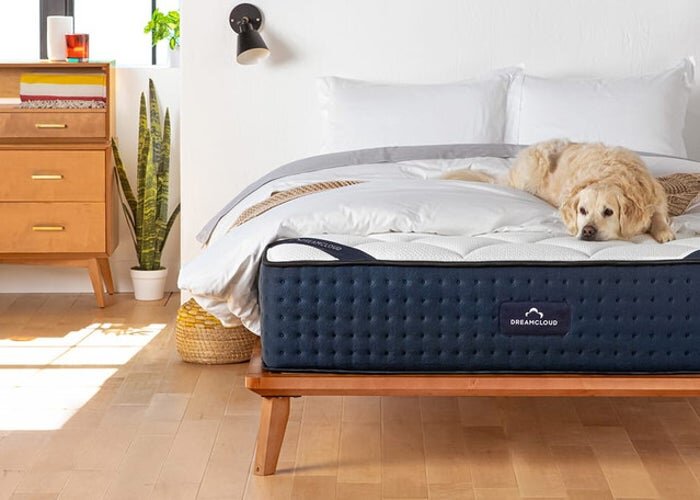
The Dreamcloud Premier Hybrid Mattress sells for just $916 in queen, and $1085 in king size. I’d recommend it over most luxury mattresses that sell for as much as $2500 and up, primarily because you’re getting pretty much the same components and quality. Pro tip: Dreamcloud also uses a 4lb density memory foam instead of the industry standard or 3lb. Read more about foam density here.
I’m a back and side sleeper, constantly moving to keep my hips from getting sore. I find I can spend more time on both sides (up to an hour or more vs. 30 minutes on all foam options). It measures up to what sleep doctors and ENT doctors tend to recommend for maintaining proper level spine alignment, minimizing snoring and sleep apnea, reducing pain while at rest, and more.
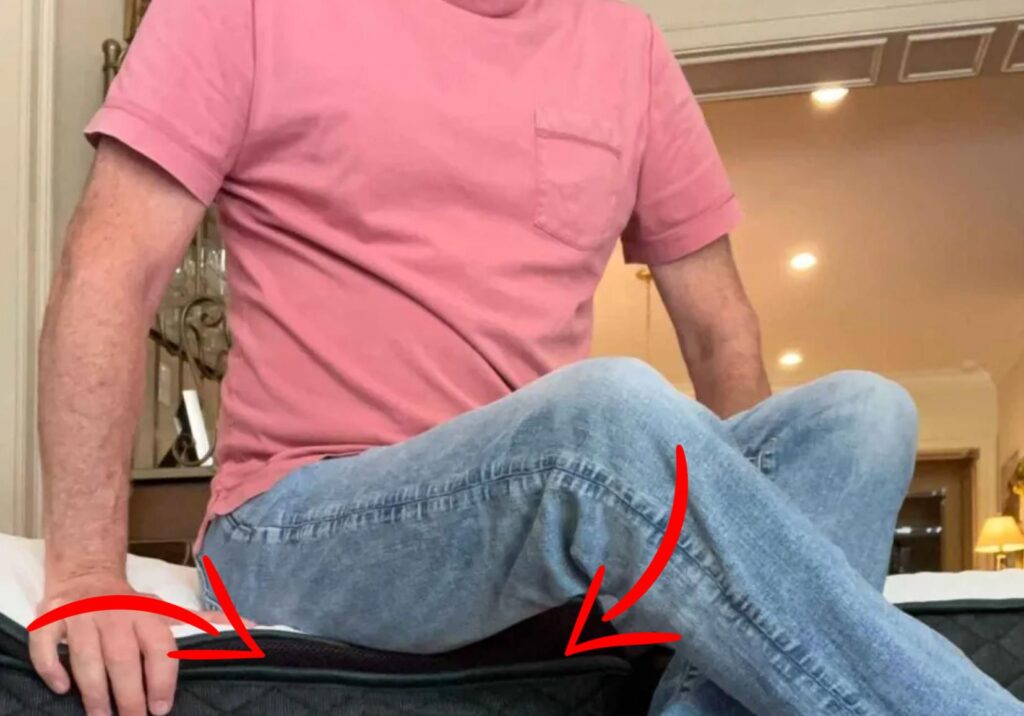
Outfitted with a quilted cashmere top piece, and two layers of fairly soft (6 out of 10)gel/memory foam, it’s the pocketed coil system underneath that keeps you floating on top.
It’s slightly softer than most hybrid mattress options, but it’s what your spine needs to keep oxygen flowing to tissues, by reducing pressure points but with a more nestled, inviting, and sumptuous feel.
Dreamcloud offers some freebies pretty much most of the time, including pillows, sheets, and a mattress protector as well.
3. The Puffy Mattress: Best Overall, Softer Than Most
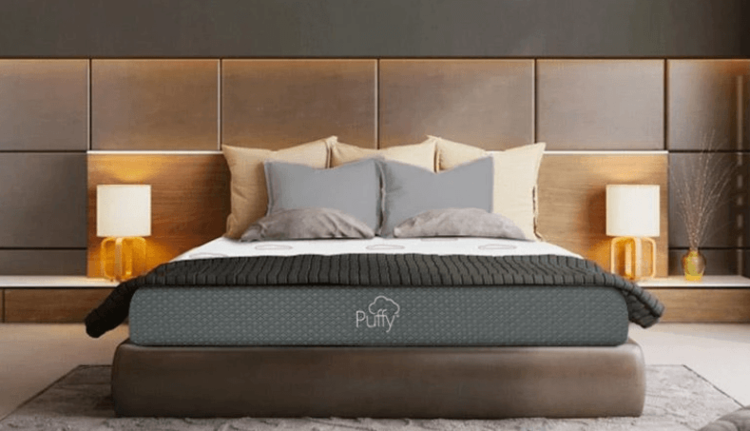
The Puffy Cloud Mattress still sits at my #1 Overall Best Mattress slot, since it works for all kinds of sleepers. The company created a unique material called CloudFoam which is a highly breathable gel/memory foam material that pushes weight and heat away from the body. It’s fairly priced, at just $1049 in queen, and $1249 in king.
It offers a medium feel, not too firm, and it very yielding and cradling, but with no trapped sensation or issues with digging your way out of bed during the night.
Along with this 10″ tall pressure relieving favorite, you’ll get a lifetime warranty, a 365-night no questions asked trial, free shipping, and their stain-resistant hypoallergenic outer covering.
4. The Sweetnight Twilight Hybrid Mattress
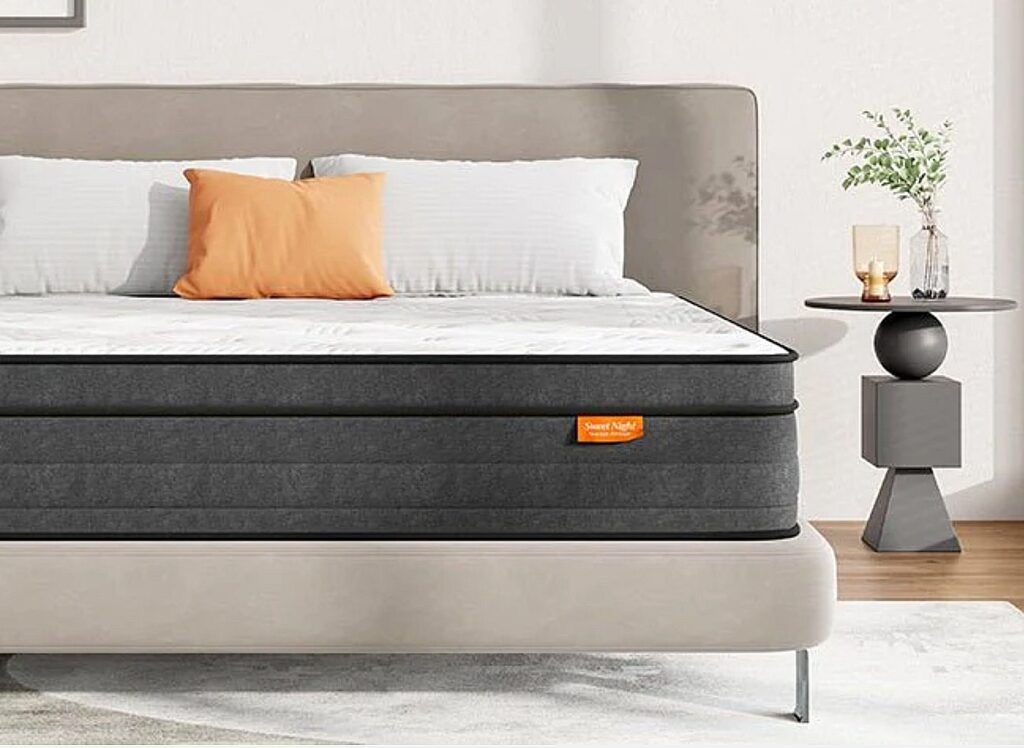
The Sweetnight Twilight Hybrid Mattress is a 12″ tall pocket coil and foam hybrid composed of 3 separate layers of supportive and comfort layers atop a pocket coil system.
It sells for a modest $699, and you get free shipping. It’s not easy to find a
The soft, rayon outer covering is a material I’ve used in my mattress designs, and it’s excellent at ventilating and keeping your body cool.
Outfitted with three layers of specialized foams including memory foam, gel foam, and supportive high density foam to cradle and elevate your body while reducing pressure points.
Shipping is free, and your mattress arrives smartly vacuum packaged in one box, arriving in about 7 days.
Although The Sweetnight Twilight Hybrid Mattress is often classified as a budget mattress by other review sites, it’s a strong contender if you want the targeted support offered by pocketed coils along with plenty of cushiness for hips and shoulders up top.
It’s packaged and shipped in a thicker and sturdier-than-average box, and my sample arrived totally unscathed. Each mattress is vacuum packaged and shipped in a thick-walled plastic bag.
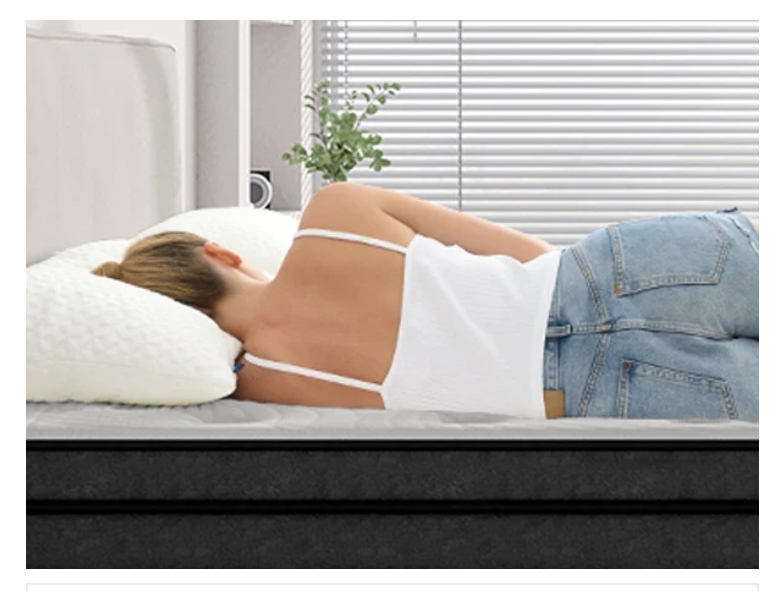
The Sweetnight team offers a variety of other mattresses on their site, but the Twilight Hybrid follows the same design that I used in many of my hybrid bed in a box mattress options for years.
Softer, yielding layers up top that offer immersion and yielding, and a pocketed coil superstructure layer that lifts and elevates your body to maintain proper spine alignment.
Practitioners who understand the importance of spine alignment and weight distribution have recommended similar brands for years, including much costlier brands like Tempur-Pedic and others.
Order your 12” Sweetnight Twilight Hybrid Mattress and you’ll get a perfect, medium firm sweet-spot mattress that I think is a value.
5. THE PUFFY LUX MATTRESS
I always believe that with any mattress recommended for pain relief, the underlying layers of supportive material need to be resilient and firm, but precisely calibrated with the softer layers up to deliver buoyancy and lift.
The Puffy Lux starts with a firmer base layer underneath, then stacks subsequently softer layers up top, designed to create a “cumulative” effect that helps dissolve pain and alleviate pressure.
Owners like the float factor that The Puffy Lux seems to provide, and having a thicker layer of the gel memory foam (the “good stuff”) above the pocketed coil layer means better pressure relief, especially at shoulders and hips.
And, at just $1,495 in queen (use my link to get a $300 instant discount off the regular $1,795 price), it’s priced nicely considering the features and benefits you’ll get.
I liked the nest-like, “tucked in” sensation I received when testing the mattress, thanks to textiles and foam components that remove body heat to the sides of the mattress. For the money, it’s an investment well worth the price.
Most foam mattresses often make you feel trapped and confined and miss the mark. I recommend the Puffy Lux Mattress as an alternative to the typical softer mattress, which often does not provide pain relief.
Besides calming muscles and joints, you’ll likely feel cradled and snuggled in, but not stuck. I looked at a large sampling of customer reviews on Google, and many owners expressed relief from pain related to back issues, neck pain, arthritis, and shoulder and hip pain.
Out of 8,500 reviews, the Puffy Lux Mattress scores a solid 4.8 out of 5 stars for comfort and support, pretty impressive for a pocketed coil hybrid mattress.
The Puffy Lux Mattress incorporates Certi-Pur®️ rated foam ingredients, too, that eliminate toxic materials like VOC’s, heavy metals, formaldehyde, and PBDE’s from the ingredients, providing a cleaner, safer mattress environment. Few luxury foam mattresses are crafted using these greener materials.
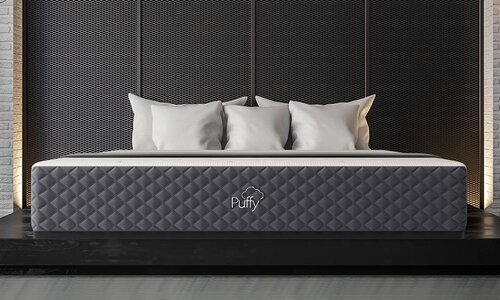
Your body has pieces and parts that need different kinds of support. We found very few pain relieving and supportive mattresses that incorporate a well thought out map that provides better support and “uplift” for areas like hips and shoulders.
Also, your head weighs between 13-15lbs. on average, and also needs more support than say your extremities.
The Puffy Lux Mattress has four different zones that have distinctive material densities to properly buoy and cradle your body to relieve pain and distribute pressure effectively.
A lot of research when into the design of this mattress, and I’ve seen so-called “therapeutic” mattress brands that sell similar products for up to $6,000 to get the benefits you want from a mattress a doctor would advise buying.
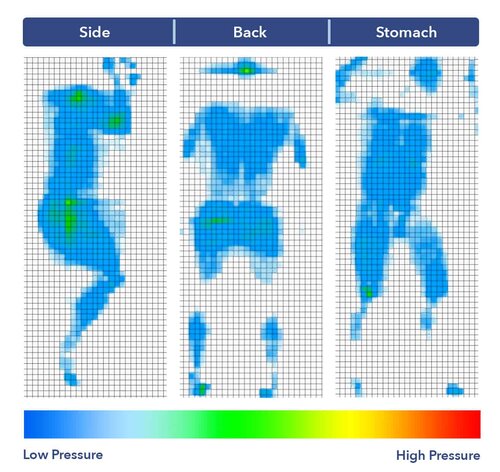
The Puffy Lux Mattress is manufactured in the U.S., which I like to see, uses advanced materials like infused cooling beads, pressure relieving gel/memory foam, and a unique layer that actively ventilates your mattress.
It’s also constructed to recognize parts of the anatomy that need more support and cradling, and the all foam version is made with four distinctive zones.
There are two choices you’ll have when ordering: the memory foam version, with body enveloping and no bounce, or the hybrid version, which incorporates a pocketed coil system for bounce and contouring. I recommend the memory foam variation to get the best pressure relief possible.
The multi-directional 4 layer system incorporated into the recipe sets the Puffy Lux Mattress apart, with advanced “SMT technology” for enhanced spine support. Separated into 4 “cloud zones” (that sounds nice!) the Puffy Lux is designed to provide customized support to the back, and a softer feel for the head, neck, shoulders and feet.
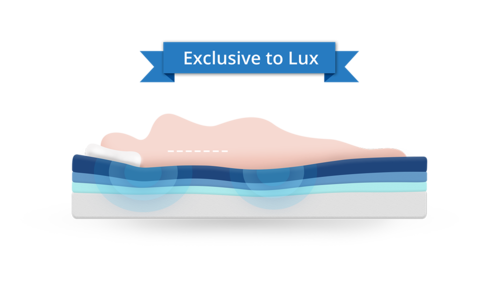
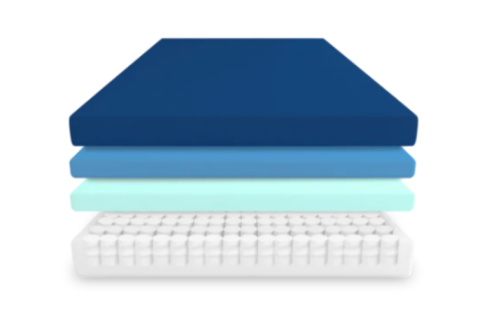
6. The Nolah Signature Mattress: A Side Sleeper Favorite
I’ve been recommending the Nolah Mattress lineup for a while now. They are a U.S. based company that offers three models, including their Nolah 10”, their Nolah Signature 12”, and their pricier Nolah Evolution Mattress. Honestly, of all three, I only recommend the Nolah Signature model because it’s affordable, customers love it and recommend it, and because it’s flippable between a firmer and a softer side, you’re really getting two beds in one.
Priced at just $1299 after an instant $300 discount with my link, the soft side up is perfect for pressure relief at shoulders, hips, and great for side sleepers who experience tenderness near hip and shoulder joints.
Soft side up, owners describe the pressure relief they receive as instantaneous, and with a notable reduction in tossing and turning. The firmer side is supportive without being rock hard, and makes it easier to change positions and transfer in and out of the mattress.
Basically, you sink in a little more on the softer side, but not so that you can’t dig your way out, as I’ve seen with many foam mattresses.
Since the mattress is easy to handle, owners will occasionally flip their Nolah Signature to firm side up when they have bouts of back pain or other issues that require straight and level spine alignment.
Read our full Nolah Mattress review online.
Doctor Recommended Mattresses in Review
Physicians, chiropractors, physical therapists, massage therapists, and other clinicians who see patients every day about their sleep problems seem to all recommend the same general characteristics in a therapeutic mattress. Certainly, spine alignment and proper support are crucial to getting an undisturbed night’s rest, but comfort and emotional wellness with any mattress is important too.
I recommend replacing your mattress every eight years and spending some time finding a mattress that meets your specific medical profile. If you have back problems, for example, focus on mattresses that are nurturing for your spine, muscles, and connective tissues. If you have sleep apnea or respiratory concerns, focus on buying a mattress that will encourage you to sleep on your back or your side more efficiently.
Opt for the firmest mattress you can tolerate. If you plan to buy a mattress online, speak to your practitioner and get their thoughts as to brands they recommend as well, and then hit a few retail stores to test drive some mattresses to get an idea about the type of mattress you need. For more information, check out some links on my site. Thanks for reading!
